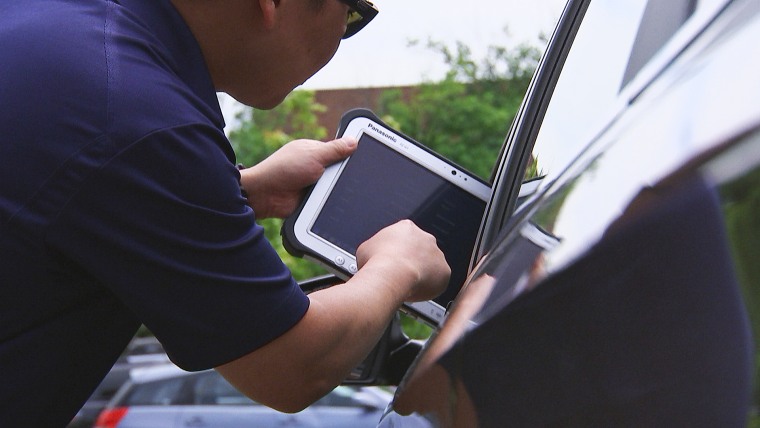A device designed to catch drivers distracted by cellphones is one step closer to being approved in New York state, but it's facing backlash from privacy advocates who fear it's too intrusive.
With the "Textalyzer," police could get a roadside glimpse into whether drivers were texting, emailing, browsing social networks, or taking a selfie while behind the wheel.
New York's state legislature is one of several interested in allowing Textalyzers. On Wednesday, Gov. Andrew Cuomo directed the Governor's Traffic Safety Committee to study the technology and review any constitutional or legal issues associated with it.
"This review will examine the effectiveness of using this new emerging technology to crack down on this reckless behavior and thoroughly evaluate its implications to ensure we protect the safety and privacy of New Yorkers," Cuomo said in a statement.
Supporters of the technology say it will only reveal phone usage, not the content of what a motorist is doing, and say that police wouldn't be able see personal pictures or read emails or texts. If the phone were password-protected, the owner would have to unlock it first.
The Textalyzer — a tablet-like device that police officers would plug into suspect drivers' phones — is expected to be ready in the coming months, but it has already raised some legal questions.
"The first concern is that it gives officers full discretion to decide who to use the Textalyzer against," said Rashida Richardson, legislative council for the New York Civil Liberties Union. "That allows for a lot of bias."
Then there are questions regarding officers accessing an individual's phone.
"We can't give the government the power to peer into everybody's digital lives indiscriminately, because that might create a bigger problem than the one we're trying to solve in the first place," said Neil Richards, a law professor at Washington University in St. Louis who's an expert in privacy and civil liberties. "The way to do it is if the police suspect a case of distracting driving, they go and they get a warrant and they compel the records from the service provider."

But that simply isn't enough, according to Ben Lieberman, a leading advocate of the Textalyzer. Lieberman's 19-year-old son Evan was killed by a distracted driver in 2011.
"Phone records only give you a small sliver of information, Lieberman said. "Anything internet-related doesn't show up on a phone record. Anything social media, taking selfies, Pokemon Go — any of these things that can be a problem won't show up on a phone record. That's like giving a Breathalyzer that just detects beer."
Only looking at phone records is "like giving a Breathalyzer that just detects beer."
That isn't convincing enough for many legal experts, who refer to a 2014 Supreme Court case, Riley v. California, in which the high court declared that law enforcement must have a search warrant to open a phone confiscated during an arrest.
Cellebrite, the Israeli-based company that makes the Textalyzer, dismisses privacy worries.
"When we talk to the critics, we explain we’re not getting anything about what was said in the text, or who it was sent to — just the touches and swipes," Jim Grady, CEO of Cellebrite USA, said.
While the Textalyzer isn't supposed to access photographs, some fear the officers still might.
"There’s no guarantee when you hand your cellphone over to a police officer that that officer won’t be looking at or copying all kinds of personal data about you," American Civil Liberties Union senior policy analyst Jay Stanley said.
Fourteen states have banned cellphones while driving and 46 states have banned text messaging while driving. In 2015, 3,477 people were killed and 391,000 were injured in motor vehicle crashes involving distracted drivers, according to the National Highway Traffic Safety Administration (NHTSA).
Richardson, from the NYCLU, said there are other solutions.
She cited recent NHTSA guidelines, which encourage cellphone makers to develop a "driver mode" similar to airplane mode that would lock out certain apps or functions.
"We're not trying to deny that distracted driving is an issue," she said. "We just need something that will actually alter behavior rather than contributing to problems in the criminal justice system."
